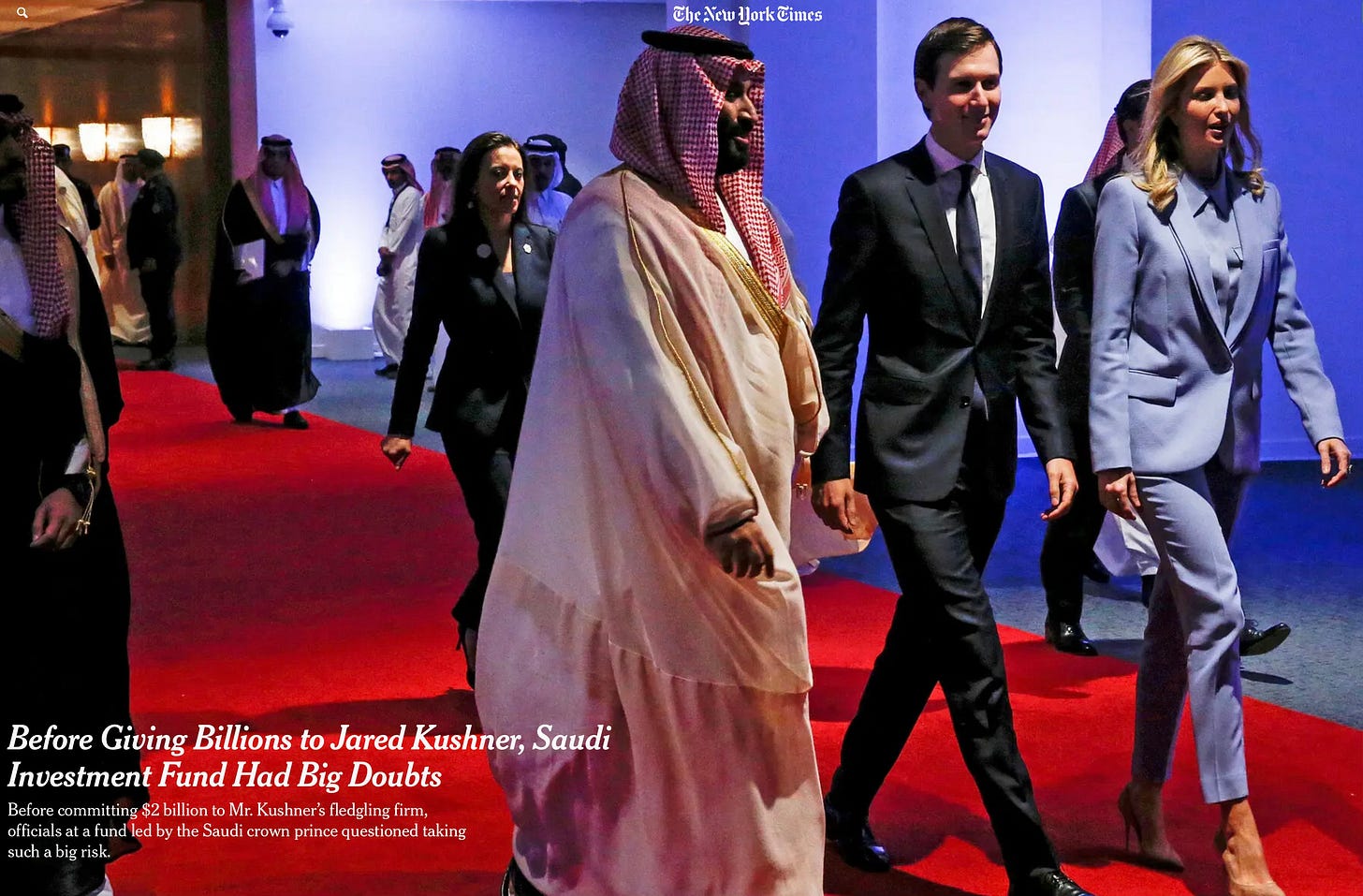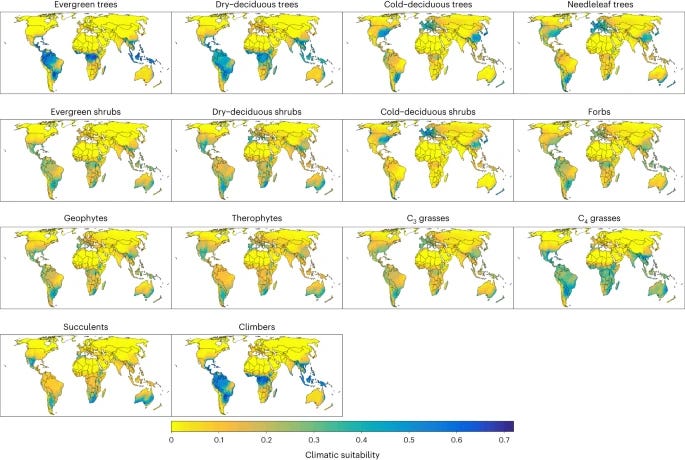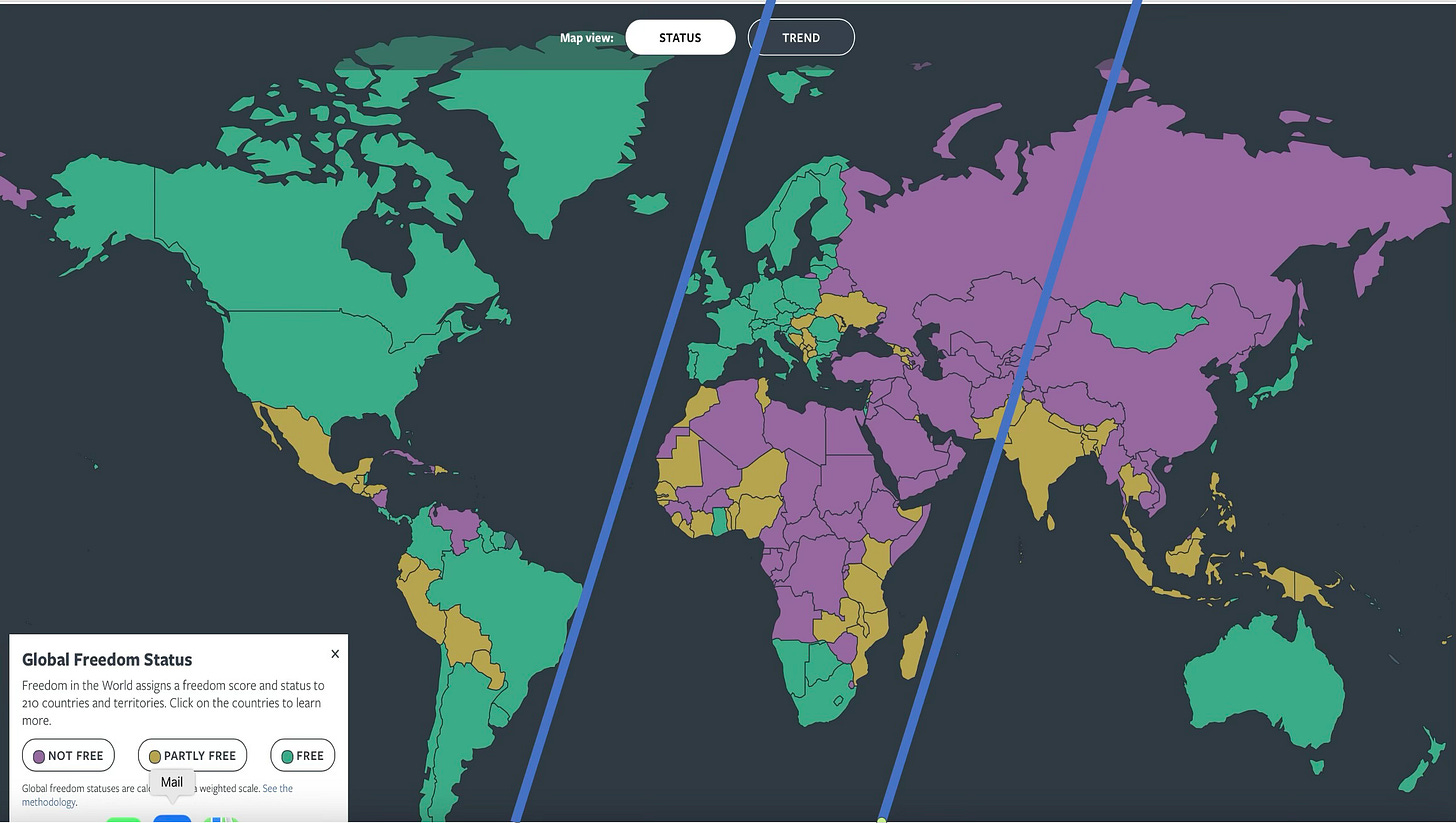Sunday Cutdown XIV (3/3/2024)
Clearing my inbox of stories I want to document
1) The Uncommitted versus the Dedicated
NYT: What Does the Uncommitted Vote in Michigan Mean for 2024?
NYT: Israel Is Losing Its Greatest Asset: Acceptance
Old bit I used to use in briefs: The chicken is dedicated to making your breakfast happen. But the pig? He’s committed.
When we go to war, the public is dedicated but the troops are committed.
Important distinctions here.
Israel, right now, is committed to its survival in a manner we haven’t witnessed in decades. America may be dedicated to finding a just peace, but we are not committed to that goal.
Thomas Friedman is correct in identifying what Israel is sacrificing with its harsh diminishment of Gaza (both in terms of size and self-governance): its standing/acceptance in the world. That’s nothing to trifle with, but 7 October was a serious reset for Israel, as I have discussed before, that it’s prepared to spend some serious time in the wilderness if that’s what it takes.
If you are all-in on this approach, you probably want Trump re-elected, because he will give Netanyahu the same blank check he offered before.
If you want some brakes applied, then Biden is clearly your man, despite his performance to date. Biden is your Nixon-goes-to-China figure on this one: based on his long and unstinting support to Israel, he’s a trusted player to force a less destructive path.
Protest Biden now in the primaries — fine. I get it.
But do not imagine that protest vote is anything but self-negating if it gets Trump back into the White House. The Trump clan is eminently buyable, as the Saudis already proved.
2) Everything you’ve ever done, said, or thought can be held against you
POLITICO: The Government Really Is Spying On You — And It’s Legal
My notion of the Quantum Grand Strategy of conquering nations from within, using the access point of the smartphone: of course, I recognize virtually every major player out there is working this angle — mostly along commercial means but constantly bumping into public uses (like Ring porch cameras being used to patch together crime-scene surveillance ex post facto by police departments).
Simply put, everything bleeds into everything.
So no, not surprising to see stories noting the USG’s ambitions in this regard. Frankly, as a citizen, I’d be worried if it wasn’t, because otherwise we’d be led by people asking things like, How many YouTubes could you fit in this briefcase? And so on.
The gateway drug is always consumer data. What could go wrong? Plenty of course. But it’s a whole lot different when you have a free press working this and a judiciary cracking down on this — two institutions China currently lacks.
So, when I see an article like this, it makes me glad. I have no illusions about privacy in the future, which is why I never want to have a government clearance again (my past includes S, TS, TS-SCI, and Q). I see no benefit in the information accessed and a whole lotta personal and career vulnerability better avoided.
Back to the story: it introduces an interview with journalist Byron Tau on his new book Means of Control. I am sure it is good because I have read him in the past. I just don’t plan to freak out about it.
This is simply the world we now live in, so I expect competing superpowers to inhabit it in the same way as every other ambitious player.
3) How many YouTubes am I holding up?
NEWSWEEK: Justice Alito's Question in Supreme Court Hearing Leaves People Stunned
Supreme Court hearing on how content on social networks might be regulated leads to Justice Alito asking a truly revealing question:
Let's say YouTube were a newspaper, how much would it weigh?
I touched upon this issue in America’s New Map:
We simply do not yet appreciate the size and scope of today’s digital iteration [of globalization]. This is odd considering the United States is the undisputed global leader in digital content production and export platforms. Chalk that up as another example of technology and economics outpacing our political and security understanding. On that, see the Saturday Night Live skits showing elderly US politicians lacking basic understanding of today’s digital landscape—not a good sign as global value chains grow knowledge-intensive and national governments become more territorial in the cyber realm.
The SNL skit on Alito writes itself.
The internet was not kind, suggesting a massive bong hit before trying to answer that one, or begging Alito to recuse himself on account of sheer ignorance.
The massive bong hit seems about right: Whoa dude! Let me see … hmmm … how many YouTubes can dance on the head of a pin? Wait for it …. wait for it ….
4) Where the growing things are
NATURE: Reassessment of the risks of climate change for terrestrial ecosystems
True science speak here:
Forecasting the risks of climate change for species and ecosystems is necessary for developing targeted conservation strategies. Previous risk assessments mapped the exposure of the global land surface to changes in climate. However, this procedure is unlikely to robustly identify priority areas for conservation actions because nonlinear physiological responses and colimitation processes ensure that ecological changes will not map perfectly to the forecast climatic changes. Here, we combine ecophysiological growth models of 135,153 vascular plant species and plant growth-form information to transform ambient and future climatologies into phytoclimates, which describe the ability of climates to support the plant growth forms that characterize terrestrial ecosystems. We forecast that 33% to 68% of the global land surface will experience a significant change in phytoclimate by 2070 under representative concentration pathways.
The key bit is the percentage estimate: I personally would bet on the higher number: indicating that the vast bulk of the world will see its climatic capacity to support its traditional plant distribution radically altered, forcing profound adjustments on the part of any industry relying on, or protecting, the land.
5) Overcounting Whites in America?
NYT: No Box to Check: When the Census Doesn’t Reflect You
The gist:
People of Middle Eastern and North African descent are usually counted as “white” by the U.S. government, though most do not identify that way.
Not really the same issue elsewhere around the world, as America is uniquely fixated on White-v-Black on a host of backgrounds where that dichotomy does not fit.
“You come to the U.S., and if you’re dark skinned, then you’re Black. But there’s nothing in Somali that’s ‘Black’ or ‘white.’ Sometimes I choose ‘other’ and sometimes I choose ‘African American.’ ”
Faisal Ali, 29, identifies as Somali and Arab
Leads me to believe we underestimate the share of people who don’t identify as European White, a situation that, per the piece, matters more and more in states like Michigan with its high Arab concentration.
So it’s really about the “massive undercount” of Arabs.
Census Bureau is working the issue, reflecting the growing frustration of that group.
“I have never passed for white a day in my life. There is no way that I should be hidden into this category. Now my numbers go into this category of culture that I do not belong to, that I’m not recognized as, and that I don’t share privileges with.”
Susu Attar, 42, identifies as Iraqi
6) The West is the worst … place for autocracies?
FREEDOM HOUSE: Freedom in the World 2024
The latest freedom map from Freedom House.
I add the blue lines signifying my three vertical slices of an increasingly North-South world and what do we see?
We see that the West Hemisphere is not a place suffering much autocracy (Cuba, Nicaragua, Venezuela, Haiti). In contrast, Europe and Southern Africa look like democracy beachheads in a slice dominated by autocracy. As for Asia, a somewhat even distribution between free, not free, and inbetween.
7) India following the script
WSJ: Big Spending on Infrastructure Powers India’s Growth
REUTERS: India to build new naval base on Lakshadweep archipelago to boost security
Modi is spending big-time on infrastructure. Priming the election pump? You bet. But it matches India’s moment and trajectory if it is going to cash in that demographic dividend.
Paved roads, power grids, rail roads — Hamiltonian “internal improvements” all.
So too are naval bases.
India is finally detaching from Gandhi’s reification of rural life.
Modi is the man, despite his faults and his tendency to lean on Hindu nationalism.
He simply had to happen.
8) MAGA+WCN=CC Denialism
WAPO: The overlap of Trumpism and Christian nationalism
NEWSWEEK: Map Shows Climate Change Denialism by US State
PRRI: Support for Christian Nationalism in All 50 States: Findings from PRRI’s 2023 American Values Atlas
Correlation is not causality … except when it is.
White Christian Nationalists skew Trumpian — no surprise there.
State-wise, support for WCN looks like this on a map:
Climate change-denialism fits that general pattern:
Fascinating to see the denialism hottest where climate change is most rapidly exhibiting impact.
The willfulness on America’s changing racial make-up matched by the same on climate change’s growing impact.
Belief conquering reality — just mostly concentrated among aging Whites, meaning the “dying breed” concept is real in relative terms, which is what gets you all the existentialism and the threats of violence that go with it.
It also makes clear the alt-Right strategy of forcing social unrest and violence, because, without it, this transformation unfolds silently all around them.
9) Nice looking factory you got there. Be a shame if somebody set fire to it.
REUTERS: In unusual move, China offers to back Hungary in security matters
China moves in with its infrastructure offerings, often built by its own imported labor. Then it wants special rights to “protect” those expats and its investments, so it’s pushing Safe/Smart City solutions via Huawei and national flagship surveillance firms.
Pretty soon you, the targeted nation, find that you’re sharing policing duties with this outside power.
You’ve been muscled.
10) The real Tex-Mex crisis
CNN: One of the world’s biggest cities may be just months away from running out of water
WAPO: A massive Texas wildfire is now the largest on record in the state
Texas literally burns while Abbott plays Third World strongman at the border. Meanwhile, Mexico City flirts at following the path of Sanaa in Yemen — a capital city gone dry in a country going dry.
The ultimate crisis is staring us in the face, but we remain fixated on the proximate variant: masses of people being put on the move by climate change.
We’re not going to scare them away, nor can we shoot them all — as some fantasize.
Show me a future where we escape figuring this thing out — the immense northward pressure created by all the world’s species instinctively moving poleward, matching the velocity of shifting climates.
Again, we are rearranging deck chairs on the Titanic.
11) It makes more cents to be partners
FINANCIAL EXPRESS: Partnership pays: Many Chinese firms are forming joint ventures with Indian players—that’s the way to go
Xi may have a hard time watching India steals all of China’s developmental thunder and momentum, but lower down, Chinese firms can see the writing on the wall.
As I have said all along: this will happen because it makes a lot of sense, profit-wise.
This article is truly fascinating to me.
First, a quick primer on the PLI scheme mentioned below, from Wikipedia;
Production Linked Incentive, or PLI, scheme of the Government of India is a form of performance-linked incentive to give companies incentives on incremental sales from products manufactured in domestic units.
Now, from the FE story:
While global as well as local players had a strong footing in the auto sector, the curbs on Chinese automobile players did not affect the market, but the scene was different in the case of mobile handsets. Here the market was dominated by Chinese manufacturers, all of whom had assembly plants in the country. Apart from coming out with a production-linked incentive (PLI) scheme for smartphones for local as well as global players later in 2020, which saw Apple setting up its manufacturing base in the country, the government started asking Chinese players to open up their supply chain.
None of the Chinese players had participated in the PLI scheme. They only catered to the domestic market, and their supply chain, including their distributors etc comprised Chinese entities. It was a closed network. The government gave them a clear signal—open your network to domestic players and start exporting from the country. In the process, several cases of violations of forex and tax laws against some of the players were registered, which are undergoing investigation. The government’s strategy seems to be working now. Xiaomi has already entered into a pact with domestic contract manufacturer, Dixon and Optiemus for the manufacture of its phones. Reports suggest that other players like Oppo, Vivo, Realme, and One Plus are also in the process of outsourcing their manufacturing to domestic players. Such partnerships are good for domestic players as well as consumers. While Apple and Samsung are strong brands with manufacturing presence in the country, their combined market share will be around 25%, so the majority of the market is served by Chinese players. Technology, marketing and manufacturing pacts will thus benefit all stakeholders.
A similar development is also taking place in the auto sector.
Not an easy relationship to develop, mind you, but too logical, in globalization terms, to eschew. It just makes sense, and so India is somehow finding a way to finesse it with Chinese firms, who are encouraged to open up their existing supply chains to insert up-and-coming Indian firms and, by doing so, continuing to extend globalization’s integrating dynamics.
As I have said many times: the last-in must step up to integrate the next-up. Crazy and naive to predict with China and India — until it just happens.
Nobody in our Pentagon has any idea what this development portends, but it’s a big deal.
12) On dry and liquid natural gas, the details matter
ROCKY MOUNTAIN INSTITUTE: Reality Check: US Natural Gas Is Not a “Cleaner” Alternative Fuel
Natural gas is cleaner in terms of its use, than coal or oil, but, as the RMI points out, if you factor in the externality of all those leaky transport pipelines throughout our country, that advantage is squandered — or worse.
Thus, some investment commitment is required here to make good on the promise.









